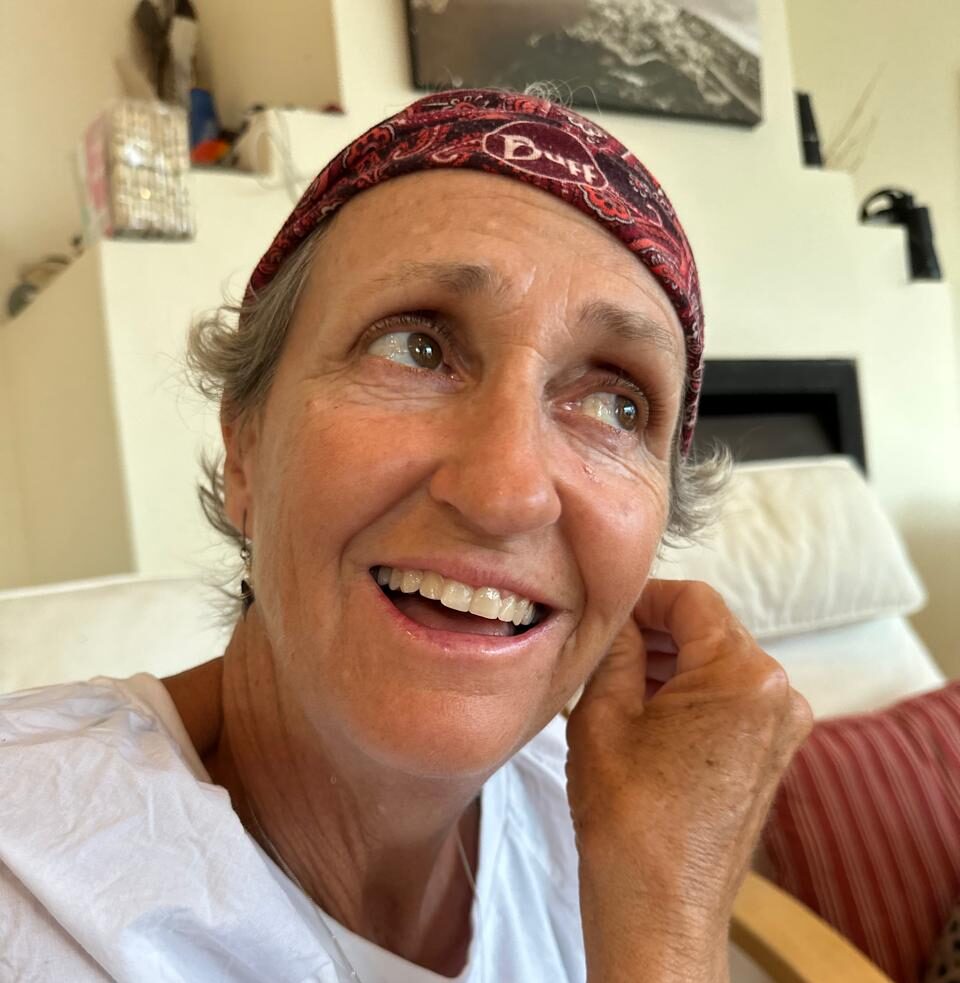Cancer is a brutal opponent. It doesn’t strike just once; it drags you into a relentless 10-round fight where every small victory is temporary, every reprieve is just the pause between blows. Angé fought with everything she had. For three years, she faced every round — the shock of the diagnosis, the surgeries, the endless chemotherapy, the fragile moments of hope when we thought we’d beaten it, and the crushing return of the disease that told us we hadn’t. By February 2025, we knew the truth: cancer was winning. From that moment, the fight became less about beating it and more about courage — about standing tall, even while knowing the final bell was coming.
And yet, even with all that time to prepare, nothing could ready me for the moment it would end. Preparation is an illusion. You can know it’s coming, you can whisper to yourself that you’re ready, but when the person you love takes their last breath, every ounce of readiness shatters.
It was just after six in the evening when I placed the final patch on Angé. We both knew her body was too weak for another one, but the pain was unbearable, and we needed to bring her some relief. As I pressed it against her paper-thin skin, I knew — with a clarity that froze me — that her time was down to hours. Four, maybe five.
She was lying on the couch , surrounded by family. The woman who once lit every room was now reduced to a whisper of herself. She couldn’t eat. She couldn’t drink. She couldn’t smile. Her eyes stared out, unblinking. Her mouth hung open, as if even the act of holding it closed required too much strength.
But this moment — this raw, unbearable moment — wasn’t the whole story. It began three years earlier, with a routine checkup that spiraled into a hysterectomy, a diagnosis, and a fight that consumed every ounce of our lives. We clung to hope through every round, believing that love and treatment would win the battle. But cancer had its own plans, and it showed no mercy.
When Angé died, all that time we had to “prepare” meant nothing. The pain was still as sharp, the mourning as fierce. Because that’s the truth about death — it doesn’t matter if it comes suddenly or slowly, if you’ve had years to anticipate it or seconds. It still rips a hole in your life that no preparation can stop
And so I decided to walk the Camino
Angé, you left the pain is over for you. But I am writing this book, I am writing these articles because I have so many questions.
Because I have so much pain.
I need to deal with it.
I need to find a way of understanding how I’m going to live without you.
Understanding how I’m going to take that pain and turn it into a beautiful memory of you through the Angé for Sunflowers Foundation.
I need to understand how I’m going to take that pain and look at other people and smile and laugh.
And I need to understand all these questions that come up in my mind
not necessarily about why you died.
But really because I need to mourn. I need to understand the mourning process. I need to understand the things that are going on in my life and why I’m doing them.
Or if I’m trying to rebuild my life, am I building it in a way that is forward-looking, that is constructive, that is productive? Or am I building in a way that is keeping you in the same place, just looking back the whole time at the amazing life that we had together.
The fun we had. The joy we had. The adventures we had. I need to bank those in a memory bank that I can flick through every day. But I need to be able to create new memories — not necessarily with somebody else — but just by myself or with friends. Or create new friends. Or carry on the wonderful legacy of inviting people to dinner and just being. And the wonderful legacy of talking to people just because they’re human. And the wonderful legacy of cleaning up on the beaches and making our world a better place. So as an introduction to this book, the articles that I’ve written are the questions that I’ve asked. The questions that I’ve had in the first month after Angé’s death.
And I’m hoping that as I go through and explore these articles more and more — and perhaps as I work through the workbooks myself — that I’ll be able to make some sense of what my future looks like. And I guess that’s what this book is all about. It’s all about creating a new future. It’s about creating a new lifestyle. It’s about creating new habits, ones that can make you happy. Not ones that lead only to contentment. Because I think that might be a trap — saying, ‘Well, I’m okay now,’ when in reality you’re selling yourself short. We should be reaching, striving, doing our utmost for happiness. For those happy moments where we laugh and we can feel our whole being enveloped in that feeling of goodness. That feeling of happiness. That feeling of accepting ourselves and of being loved by others.
Before we go any further, I want to be honest about something:
1. I am not a qualified psychologist or psychiatrist.
2. This book is based purely on my personal experiences and the questions that have haunted me since Angé died.
3. It is not a definitive self-help book, but a raw and honest collection of reflections.
4. Please use, abuse, or ignore it as you see fit. There is no single right way to mourn.
5. If you want to share your own story, email me at angeforsunflowers@gmail.com or visit the website angeforsunflowers.com
